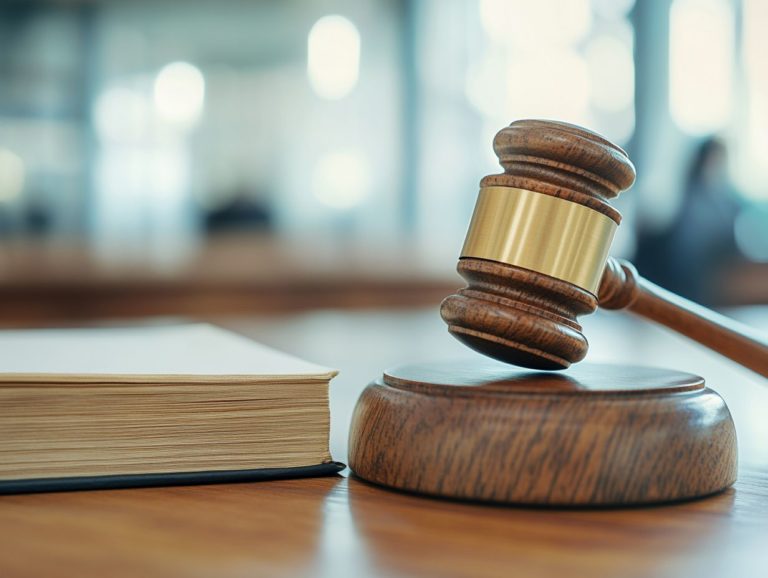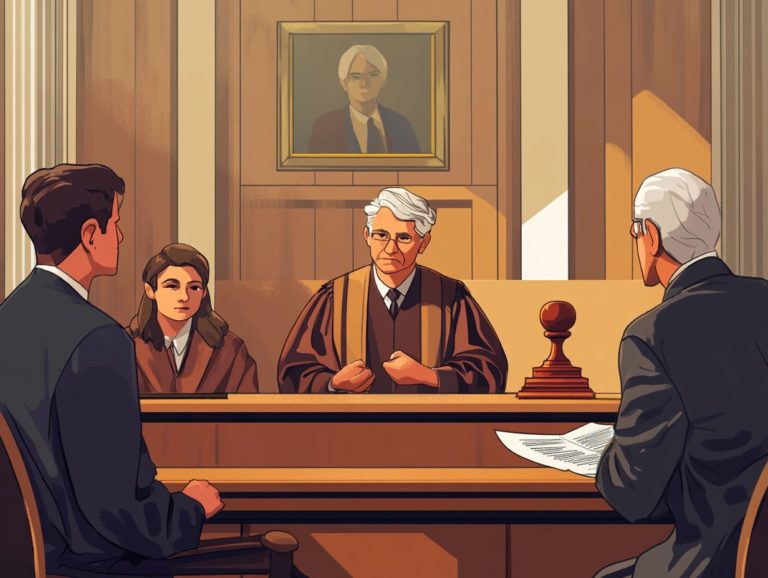Understanding the Right of the Accused to Appeal
The right to appeal is crucial. It allows those convicted of a crime to challenge their verdicts.
This article explains the right to appeal. It covers constitutional laws and the essential steps in the process.
You ll learn about common grounds for appeal and the challenges you may face. Legal representation is key to navigating this process.
Recent developments in appeal laws will also be highlighted, providing you with a comprehensive guide to understand this vital legal right.
Contents
Key Takeaways:
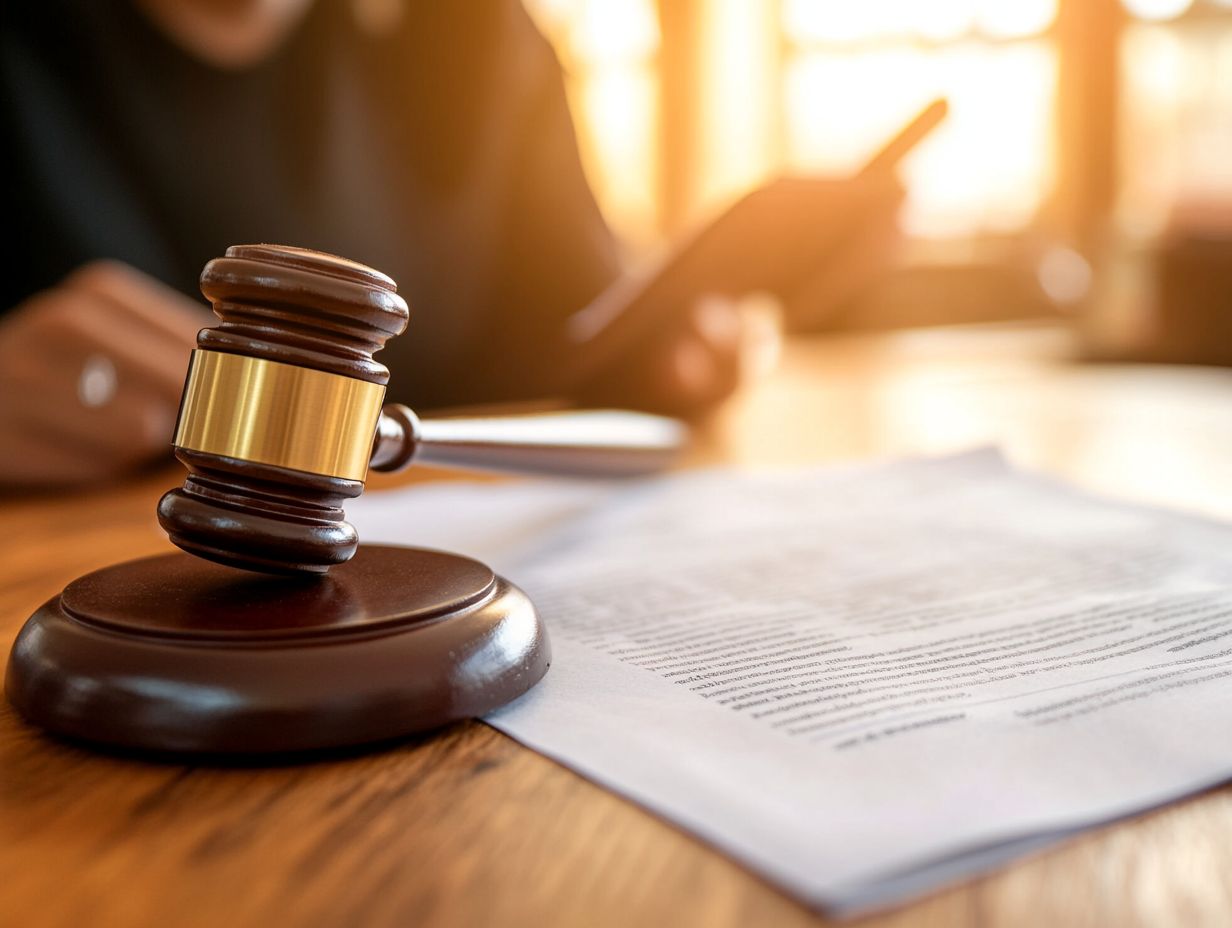
The right to appeal allows the accused to challenge a conviction or sentence in a higher court. This right is based on constitutional and international laws, ensuring fair and just legal proceedings. Legal representation is crucial in the appeal process, as it can greatly impact the outcome of the case.
Overview of the Right to Appeal
The right to appeal is a foundational legal principle that enables you, as a losing party in a trial court, to request a review of the trial court’s decision.
This right is essential for upholding legal standards and offering individuals the chance to contest verdicts that could profoundly affect their lives.
Whether in civil or criminal cases, the appeal process serves as a vital mechanism for the higher court to scrutinize the decisions made by the trial court. This ensures that justice is pursued and achieved while correcting any procedural missteps along the way.
What is the Right to Appeal?
The right to appeal grants you the legal entitlement to challenge a trial court’s judgment in a higher court. This essential principle enables you, the aggrieved party, to seek a review of decisions involving issues of law or fact, reinforcing a system of checks and balances within the judicial framework.
Such decisions include judgments in civil disputes, criminal cases, and administrative rulings. The stakes are considerable; if your appeal is successful, it could lead to a reversal or modification of the initial ruling.
To navigate this process effectively, you must adhere to procedural norms, including filing a notice of appeal within the designated timelines and compiling a thorough record of the trial proceedings. It s equally important to articulate your grounds for appeal using established legal terminology to support your case.
Legal Basis for the Right to Appeal
The legal basis for the right to appeal is firmly rooted in both constitutional and federal laws, which outline the procedures for how appeals are handled in courts throughout the United States, including within the federal court system and the Supreme Court.
These legal principles enable you to seek judicial review of trial court decisions, fostering fairness and accountability in the judicial system.
Constitutional and International Laws
Constitutional and international laws provide vital protections that guarantee your right to a fair trial and the ability to appeal decisions made by trial courts.
Among the most significant are the Sixth and Fourteenth Amendments of the U.S. Constitution, which emphasize the importance of due process and the rights afforded to defendants. These amendments ensure your access to competent legal representation and establish a structured appeal process in the event of procedural errors or injustices.
Global treaties, such as the International Covenant on Civil and Political Rights, further bolster these principles, emphasizing your fundamental right to challenge convictions and safeguarding against arbitrary detention. These frameworks ensure you can rectify legal mistakes, enhancing the integrity of judicial systems worldwide.
Process of Appealing a Conviction
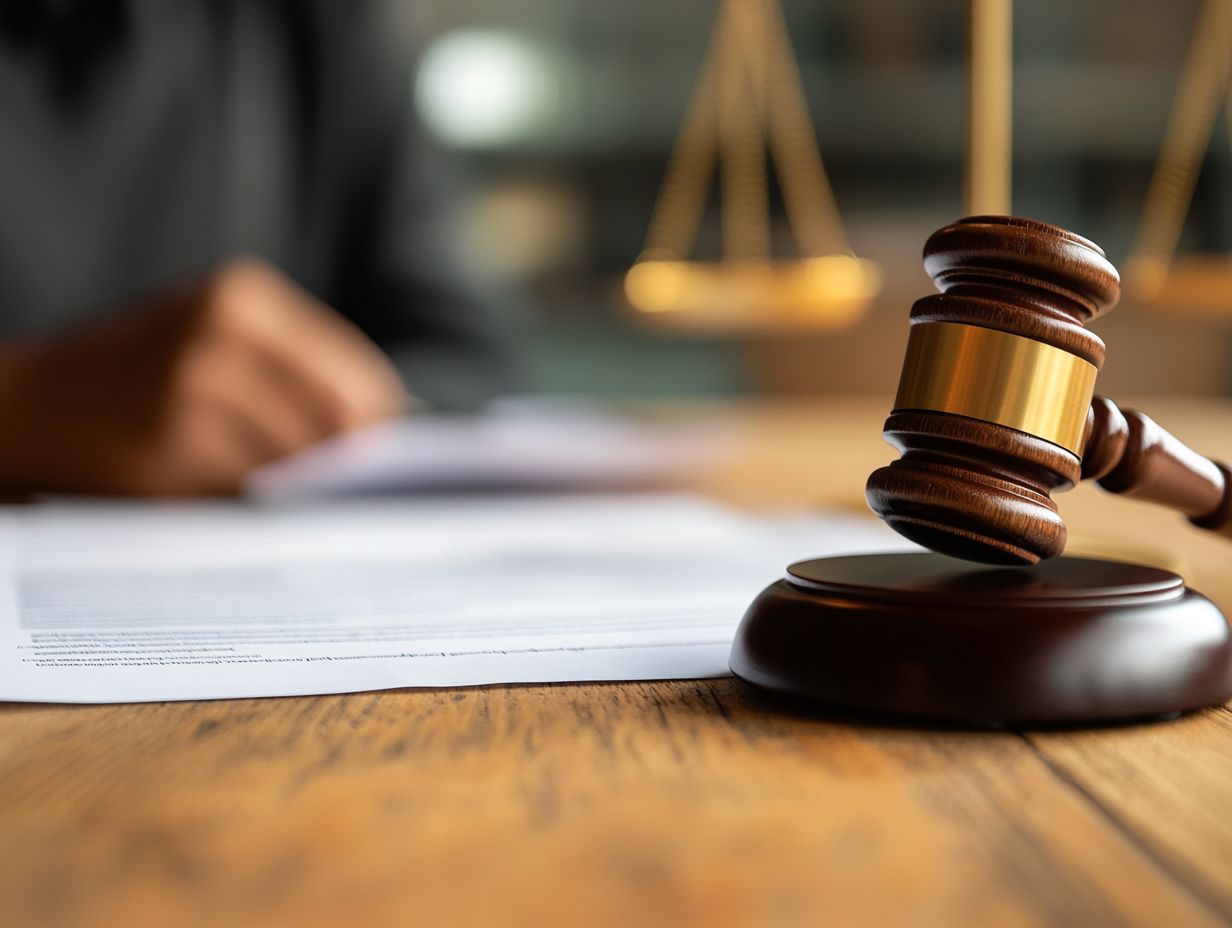
Appealing a conviction involves several essential steps. Follow them carefully to ensure your appeal is valid.
It all starts with submitting a notice of appeal, which sets the wheels in motion. Next, you ll need to prepare a brief that clearly articulates your legal arguments and grounds for the appeal.
This process may culminate in an oral argument before appellate judges who will diligently review your case. Each step is crucial, and attention to detail is paramount.
Steps and Requirements
Filing an appeal is crucial for a thorough review by the appellate court. Understanding this process can significantly influence your case outcome!
- To start an appeal, file a notice of appeal. This document informs the court of your intention to seek a review.
- Submit this notice promptly, usually within 30 days of the original ruling, varying by jurisdiction.
- You’ll also need to gather important documents like a transcript of the trial and relevant court orders.
Every component must meet legal standards. Even minor missteps could risk your appeal, potentially leading to dismissal or unfavorable judgments.
Grounds for Appeal
Grounds for appeal are specific reasons for contesting a trial court’s decision. These include legal errors, inadequate evidence, or mistakes in sentencing that affect your right to a fair trial.
Common Reasons for Appealing a Conviction
Legal errors during the trial, procedural issues, and lack of evidence often drive appeals. For instance, incorrect jury instructions or the exclusion of key evidence can undermine trial integrity.
Imagine a judge allowing inadmissible evidence that sways the jury; this could lead to wrongful conviction!
Procedural errors, such as juror misconduct, can also jeopardize your right to a fair hearing. When evidence fails to convincingly connect you to the crime, it raises questions about the verdict.
Gathering and presenting strong legal arguments highlighting these issues is essential. This strategic approach can greatly influence your appeal’s outcome.
Challenges and Limitations of the Right to Appeal
The Right to Appeal is a cornerstone of justice. However, various challenges can impede your ability to navigate the appeal process effectively.
Financial constraints, complex legal standards, and the need for experienced counsel can complicate your journey.
Obstacles in the Appeal Process
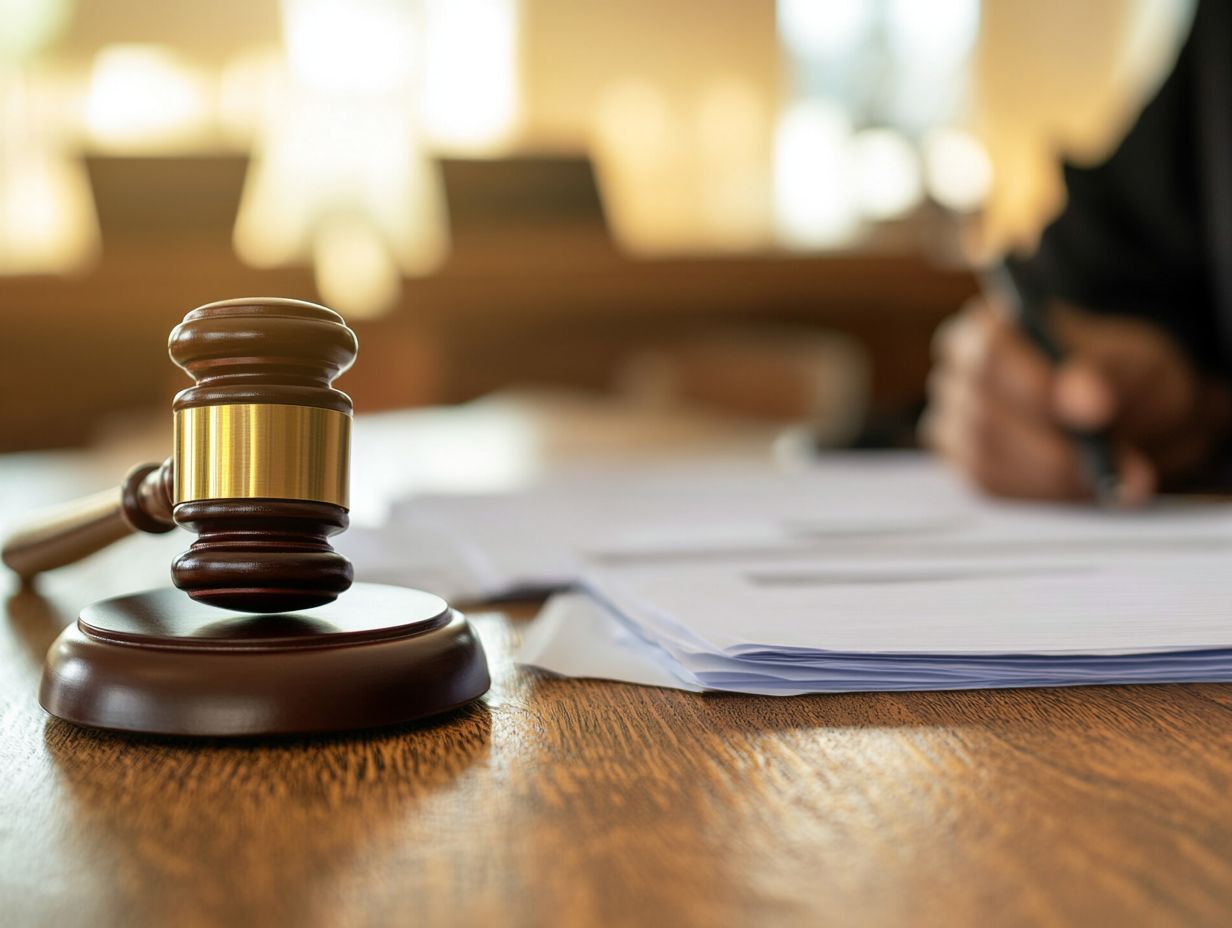
Obstacles can arise from procedural errors, insufficient evidence from the original trial, or the need for complex legal arguments. These challenges can hurt your chances of a favorable outcome.
A minor issue, like missing a filing deadline, could dismiss your appeal, regardless of its merits. Likewise, weak evidence from the original trial makes it hard to convince the appellate court of any mistakes.
Having skilled legal representation is vital. An experienced attorney can navigate these complexities, identify procedural flaws, and strengthen your case, boosting your chances of success!
Role of Legal Representation in Appeals
Legal representation is essential in appeals. An experienced attorney can navigate legal arguments, procedural requirements, and the nuances of appellate court procedures effectively.
Their expertise positions you to present your case well, maximizing your chance of a favorable outcome!
Importance of Having a Lawyer
Having a lawyer by your side during the appeal process is essential. They bring necessary legal expertise and strategic insight to help you present a compelling case before a higher court that reviews appeals.
An experienced attorney understands how to craft persuasive briefs. They spotlight errors made in your initial trial, grounding each argument in solid legal precedent.
They have the skills to deliver articulate oral arguments that resonate with judges. This means presenting your case succinctly while anticipating questions and counterarguments.
With a thorough understanding of the higher court’s expectations, they can tailor their approach to enhance your chances of a favorable outcome. This support strengthens your case and significantly boosts your likelihood of overturning a previous ruling.
Recent Developments in the Right to Appeal
Recent developments in the right to appeal signal significant shifts in laws and practices. These changes directly impact how appeals are processed and individuals’ rights within the judicial system.
Changes in Laws and Practices
Changes in laws and practices surrounding the appeal process can significantly impact your rights when seeking appellate review.
Recent legislative measures have introduced stricter deadlines for filing appeals. This speeds up the timeline and puts additional pressure on your legal representatives to prepare comprehensive documentation swiftly.
Modifications to the standards of review have recalibrated how courts assess lower court decisions. This demands a deeper understanding of nuanced legal principles from practitioners like you.
These alterations often lead to increased scrutiny of procedural requirements. Attorneys must exercise greater diligence in their case preparations.
This shift in legal frameworks shows why it’s important to adapt for both you and your legal professionals. Staying informed and responsive to these evolving dynamics is crucial.
Frequently Asked Questions

What is the right of the accused to appeal?
The right of the accused to appeal is the legal right of a person found guilty of a crime to challenge their conviction or sentence in a higher court. Alongside this, understanding the right to bail provides essential insights, as it gives you a chance to challenge the original decision and can potentially result in a new trial or a different sentence.
Who has the right to appeal a criminal conviction?
In most cases, anyone convicted of a crime has the right to appeal. This includes both the defendant and the prosecution. However, specific rules and procedures for filing an appeal may vary depending on the jurisdiction and the type of case.
What is the process for filing an appeal?
The process for filing an appeal varies by jurisdiction. Generally, it involves submitting a notice of appeal to the appropriate court within a specific time frame. The appellant (the person filing the appeal) will present their arguments and evidence in support of their appeal, and the opposing party will have an opportunity to respond.
What are the possible outcomes of an appeal?
The possible outcomes of an appeal can vary depending on the specifics of the case and the arguments presented. In some instances, the appeal may result in a reversal of the conviction or sentence, meaning the accused is no longer considered guilty or is given a different sentence. In other cases, the appeal may be denied, and the original decision will stand.
What rights does the accused have during the appeal process?
During the appeal process, the accused has the right to legal representation, as well as the right to present evidence and arguments in support of their appeal. They also have the right to a fair and impartial review of their case by a higher court.
Can the accused be retried if their appeal is successful?
If the appeal results in a reversal of the conviction, the accused cannot be retried for the same crime. This is known as the legal principle of “double jeopardy.” However, in some cases, the prosecution may choose to bring new charges against the accused based on new evidence or a different legal theory.





